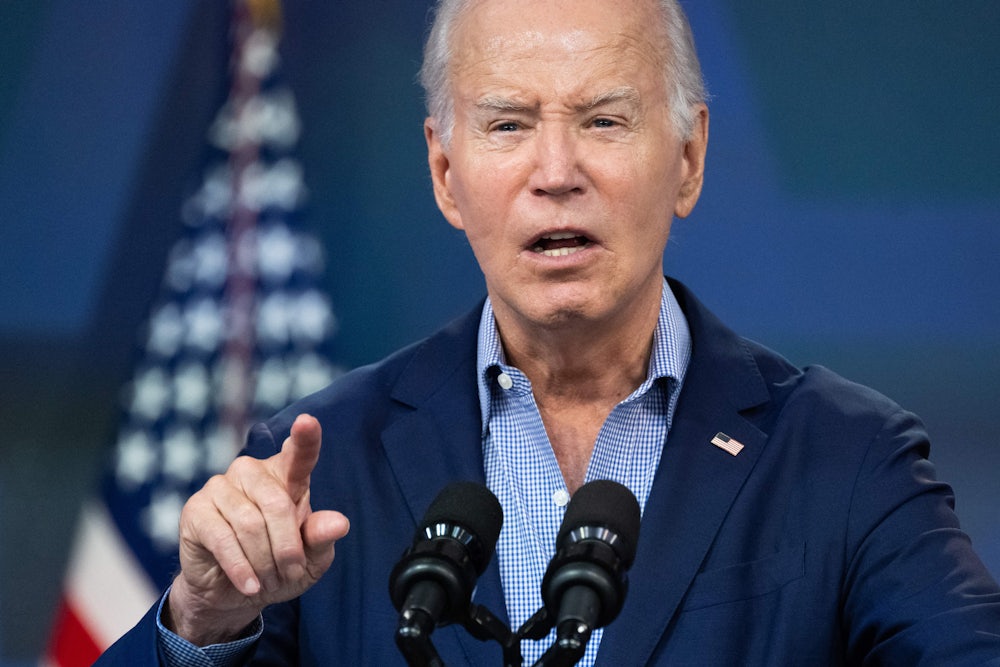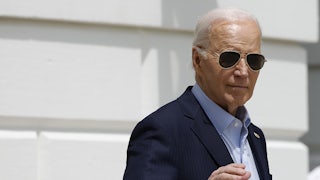I’ve been writing a lot about how Joe Biden and the Democrats need to attack Donald Trump by highlighting the threat he poses to democracy and the fact that he’s a convicted felon. They’re both important. So is abortion, which needs to be another core point in the Democrats’ campaign. But let’s always remember that most voters vote on the economy—and more specifically, on what the candidates have to say about their plans for the future.
For a range of reasons, this race hasn’t kicked into that gear yet. But it should, and soon, because Biden can win that argument—not because his plans for the future are so great (they’re nearly nonexistent so far—more on that later), but because Trump’s are so massively unpopular. Biden needs to run a class warfare campaign against Trump and his Mar-a-Lago cronies and make the economic contrast crystal clear, because the differences in economic philosophy between these two candidates is probably greater than any since FDR faced Alf Landon in 1936.
The Washington Post reported on Sunday that Trump and his advisers are set to lower taxes on corporations and rich people again. You’ll recall that the Tax Cuts and Jobs Act, or TCJA, of 2018, the only meaningful piece of legislation Trump and his GOP congressional majorities managed to pass, cut the top marginal rate from 39.6 to 37 percent and slashed the corporate tax rate from 35 to 21 percent.
There is some talk in Trump circles of cutting the corporate rate to below 15 percent, because Biden and other world leaders are trying to establish a global minimum of 15 percent so corporations can’t move from country to country for lower rates. Moving the U.S. rate below 15 percent would kill that project. The Post quoted anti-tax insider Grover Norquist as saying: “There is a discussion about going to 15 [percent] and a discussion about just under 15 [percent], to make it clear to the globalists that we haven’t signed on to their stupid treaty or their agreement.”
These kinds of tax cuts are hugely unpopular. In April 2023, Pew asked people what about the U.S tax system bothers them. The top two responses? The feeling that some corporations don’t pay their share and the feeling that some rich people don’t pay their share. And it wasn’t close. On the former question, 61 percent said it bothered them a lot; on the latter, 60 percent said the same. For comparison: Only 38 percent were greatly bothered by their own tax burden.
Every poll I’ve ever seen on these questions echoes this basic sentiment. People hate tax breaks for the rich. They want economic justice. And this is where Biden and the Democrats need to attack.
The TCJA tax cuts were temporary, set for seven years because the votes didn’t exist in the Senate for a permanent cut (no Democrats supported the bill, not even Joe Manchin). So next year, they’ll either expire or be renewed—or if Trump is president and Republicans control Congress, they’ll be lowered, because taxes on rich people can never be low enough for Republicans.
This can be political gold for Biden. He’s already said he won’t sign a renewal and will push to raise corporate taxes, but he needs to make this one of the core pillars of his campaign. To the extent that Biden has been a little quiet about all this, I suspect it’s because he and his campaign may have been hoping for endorsements from a few corporate and business-world titans who might be willing to say publicly that America should not descend into fascism.
But two weeks ago, Blackstone CEO Steve Schwarzman endorsed Trump, and the expectation is that a lot of such people will follow him. (Incidentally, Schwarzman cited rising antisemitism as one reason he endorsed the man who thought the marchers in Charlottesville chanting “Jews will not replace us” were “very fine people”; Biden’s hideous coziness with Israel probably also has had something to do with his hope that he’d get endorsements from some of these people.) Now that this bird has apparently flown, Biden should just do a straightforward soak-the-rich campaign.
The soak-the-rich approach has the virtue of being what Biden actually believes. Lael Brainard, the head of Biden’s National Economic Council, said in a speech last month: “The fundamental economic policy choice that lies ahead is whether to return to the Republicans’ failed trickle-down approach or forge ahead with the President’s proven plan to grow the economy from the middle out and bottom up. Do we want a tax system that favors the middle class or the wealthy? The expiration of Trump’s 2017 tax package next year will put tax fairness front and center.”
Biden should make it about more than the Trump tax cuts. As I noted above, the president has yet to say to America, “Here’s my second-term agenda.” It’s a little odd. I’ve written that he should propose something dramatic like an Economic Bill of Rights for a second term. Maybe he’s waiting until the convention speech. That isn’t the worst idea in the world, because if he gives a speech in Chicago that’s stuffed full of surprising new proposals, the pundits will have to talk more about that than whether he mumbled and stumbled.
But there’s a more important reason he needs to push a dramatic economic agenda: Biden can’t win an economic argument about the past. In reality, his economic record is strong, and the inflation wasn’t his doing. But very few people know or believe that. Meanwhile, people do believe, preposterous as it seems, that Trump is a successful businessman and was a good economic steward. If swing voters walk into the voting booth thinking about the candidates’ economic records, they’ll vote for Trump.
If, however, they walk into the booth aware that the guy from Scranton wants to raise taxes on the “economic royalists”—a famous FDR phrase from that 1936 campaign against Landon that Biden should think about hauling out of storage—to pay for free community college or opioid clinics or whatever, and the guy who lives in a mansion that he has valued at half-a-billion dollars wants to lower taxes again for his golfing buddies, well, that’s a vote Biden can win.
So Democrats need to talk about democracy and fascism and criminal convictions and abortion rights ceaselessly and aggressively. But at the end of the day, the voters who will decide this election care mostly about their bank accounts, and their future. The way to win a majority of them is to make Trump defend a position they strongly oppose.








